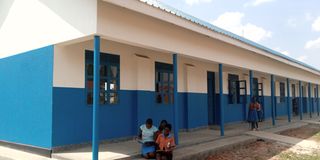Prime
NGO constructs new classrooms in 36 government schools

Pupils revise their notes under renovated four classrooms at Ajia Primary School, Itek Sub-county in Lira District on Wednesday, February 21, 2024. PHOTO BY BILL OKETCH
What you need to know:
Under the RISING Uganda project, Plan International Uganda also renovated nine classroom blocks and constructed dozens of improved water sanitation and hygiene (WASH) facilities at the beneficiary schools in Lira, Alebtong, Nebbi, Adjumani, Yumbe, Moyo, Madi-Okollo, Kamuli and Buyende
A total of 54 classrooms have been constructed in 36 schools across nine districts by a Non-Governmental Organisation to support government efforts in improving the education sector in the country.
Under the RISING Uganda project, Plan International Uganda also renovated nine classroom blocks and constructed dozens of improved water sanitation and hygiene (WASH) facilities at the beneficiary schools in Lira, Alebtong, Nebbi, Adjumani, Yumbe, Moyo, Madi-Okollo, Kamuli and Buyende.
The organization built or renovated classrooms in partnership with the Strømme Foundation.
The four-year education project (2022-2025) funded by Education Above All Foundation's Educate A Child programme aims to reach 100,000 children, particularly girls, who are most at risk of never returning to school.
Mr Patrick Emukule Ilukol, Plan International Uganda’s regional manager, while commissioning newly constructed and renovated classrooms in Lira District on Wednesday, said the project installed five stainless steel water tanks in selected schools in the beneficiary districts.
Ajia Primary School in Itek Sub-county was the venue for the commissioning of the school structures in Lira.
According to Mr Emukule, the project supplied 433 desks to schools in Lira.
At Wiodyek Primary School, Wiodyek Sub-county, two classroom blocks with latrines for boys and girls were constructed and seven classroom blocks plus a head teacher’s office and a store were renovated at Amach Primary School in Amach Town Council.
At Wigweng Primary School, two classroom blocks, and latrines for boys and girls were constructed while at Ayami Primary School, a latrine with an incinerator for girls was constructed. At Ajia Primary School, four classrooms and a five-stance latrine for boys were renovated.
“We expect that this project will lead to improved confidence in learners, their parents, and all other stakeholders to address barriers to education,” Mr Emukule said.
Mr Daniel Sentamu Kabunga, the Lira deputy Resident District Commissioner, said these structures are being made to improve children’s learning.
Mr Djegeti Omara Orech, Lira's senior education officer, thanked development partners for the support they have rendered to their education department.
"When the school management system has been strengthened when structures like these are put in place so that we have a conducive learning environment, it makes it more appealing to learners to come and stay at school,” he said.
Mr Bonny Omara, Lira District vice chairperson, said the project has led to an increase in enrollment in the beneficiary schools.
“Before the project, the total enrollment at Ajia was 300 pupils but now the enrollment has shot up to 500, and the enrollment is increasing every day,” he said.
Ms Jolly Abonyo, the head teacher of Ajia Primary School, said before their classrooms were renovated, pupils were complaining that they could not study in rundown structures.
“Currently, we are registering very many pupils since the school is now looking very attractive and child-friendly,” she said.
Ivan Ebong, a Primary Five pupil at Ajia, told this newspaper that their school was not attractive because of its dilapidated structure.
Prisca Atala, Flavia Atoo, and Lona Apio, all Primary Six pupils; and a Primary Seven pupil Sharon Nam who were studying at schools like Lira City, Kole, and Alebtong are now attracted to Ajia.




